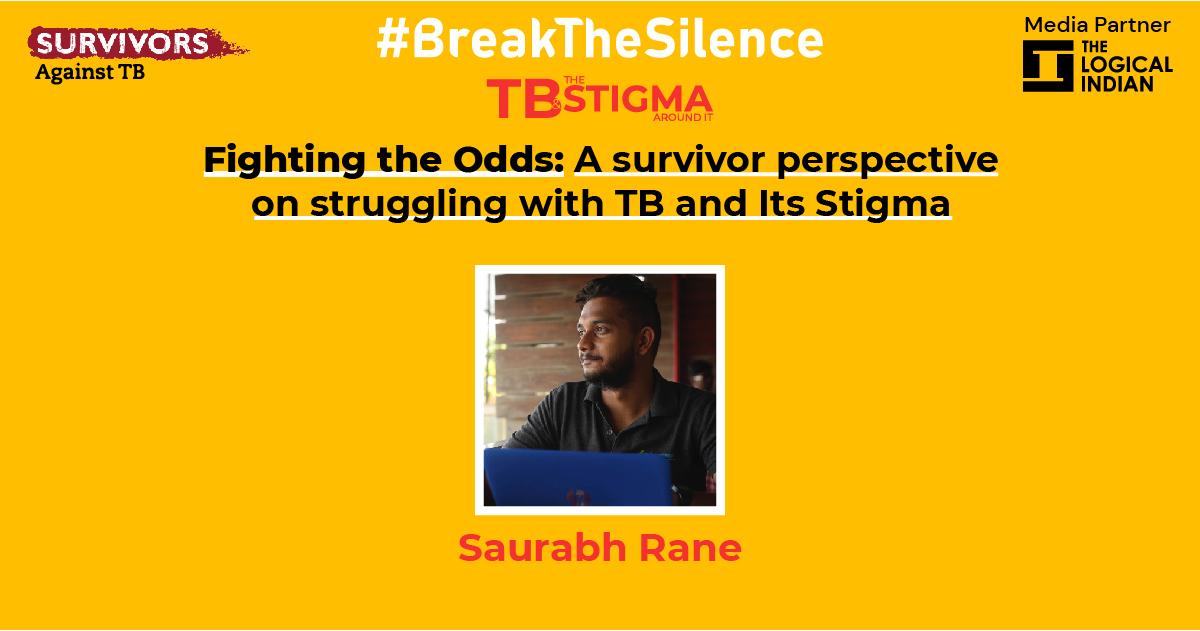
Image Credits: Survivors Against TB
Fighting The Odds: A Survivor Perspective On Struggling With TB And Its Stigma
Writer: Dr Saurabh Rane
Dr Saurabh Rane is a development professional, runner, mountaineer and XDR TB Survivor who is an advocate with Survivors Against TB, a community-based movement that is led by TB survivors, experts and advocates working on TB and other comorbidities.
India, 26 March 2022 3:57 AM GMT | Updated 4 April 2022 1:46 PM GMT
Creatives : Anusha Ramesh |
A highly motivated individual trying to broaden her artistic pursuits by integrating creative thinking with writing. Current areas of interest include design studies, illustration and branding.
Guest Author : Dr Saurabh Rane
Dr Saurabh Rane is a development professional, runner, mountaineer and XDR TB Survivor who is an advocate with Survivors Against TB, a community-based movement that is led by TB survivors, experts and advocates working on TB and other comorbidities.
TB patients don't just need diagnosis and treatment, we also need freedom from the stigma and silence around TB. We need more campaigns on spreading the right knowledge about TB.
Stigma - it's not a term you hear everyday. I remember I encountered the term in medical school. It was taught to us as something that one had to keep in mind as a consequence of some illness. But I only began to understand it when my own struggle with stigma happened in my fight against tuberculosis (TB).
I was young and ambitious when I got diagnosed with TB. I was not frightened - I knew the treatment and importance of completing it, correct nutrition, and rest. No one, however, told me how much stigma was going to affect me as a person. When that realisation did happen, it was a rude shock.
When and where does stigma start? The truth is that the TB stigma starts with society. You are made to realise that the disease may not be your fault but dicrimination will happen anyways.
No one talks about it – and you find it hard to talk about as well. You wouldn't want anyone to know what's going on with you. Often, TB patients are quietly disregarded, with fear and are treated as if they are something untouchable. People stop noticing you, avoid you, erase you from their lives – ironically, in a country with a million people having the same disease.
Yet nothing hurts more than self-stigmatisation. You blame and stigmatise yourself, whether it's because of others or the perceptions you hold, one never really knows. The world may not even be isolating you, but you are busy isolating yourself from everyone else and pushing yourself into a corner. Why would one do that? Because the truth is - the silence around TB forces you into a spiral of isolation.
I was a medical professional and yet I self-stigmatised. I feared people who discriminate. Personally, I never ever spoke about it – till I realised that not telling people about the condition was holding me back and making me miserable. I remember popping pills in bathrooms, so that people wouldn't ask me why I was consuming so many pills everyday. I was non-infectious. I was a doctor. Yet, I was not free of the fear of what the 'others' thought.
I loved playing football, but I remember just watching people play everyday. I couldn't play, so I was excluded by myself. But even when I could play, I never gathered the courage to go up to them and ask them. Why? Because they would ask me what is wrong with me – and they wouldn't let me play with them if I ever spoke the truth.
Stigma keeps you away from the things you love doing – and that's the last thing a TB patient wants. I can't even imagine what a college student or a school-going child has to go through, when they are diagnosed with TB. It's as if it isn't enough taking so many pills, facing the side-effects – and yet, keep going on.
There are millions like me. I've encountered so many cases where the wife cannot tell her husband about her diagnosis, because she fears being thrown out of the family. The poor can't talk about it, because it only reinforces stereotypes. The rich do not accept the disease, because it is considered a 'poor man's disease'. At the workplace, the fear of losing your job prevents you from speaking up about TB. In the end, we all fear isolation and loss. And there is only silence.
TB is curable, stigma is not. We need to fight it. How do we start? It starts with you and the people immediately around you. We need dialogue around TB, the suffering, and the impact on mental health involved.
TB isn't just a physically-draining disease, it's a mental health challenge too. Yet, most people in society don't understand that. Everyone may want an 'extraordinary' life, but TB patients struggle with stigma and just want an 'ordinary' life to start with. It makes you wonder why for no fault of your own, you are being judged and being put through this torture.
Awareness, the right knowledge and busting myths, understanding the patients' perspective and empathy for the person can all mean so much. It can change the way TB patients feel about us, and the way we feel about them. It's not just the family – but also the community and the government, who need to be equally responsible in tackling this problem.
TB patients don't just need diagnosis and treatment, we also need freedom from the stigma and silence around TB. We need more campaigns on spreading the right knowledge about TB.
A problem that is not acknowledged or spoken about cannot be solved. Speak about TB. The conversation will make the acceptance easier – and, in itself, solve several issues. TB doesn't always kill, but its stigma strangely can – leaving the patient alive, yet paralysed.
Bio: Dr Saurabh Rane is a development professional, runner, mountaineer and XDR TB Survivor who is an advocate with Survivors Against TB, a community based movement that is led by TB survivors, experts and advocates working on TB and other comorbidities. All section
All section














